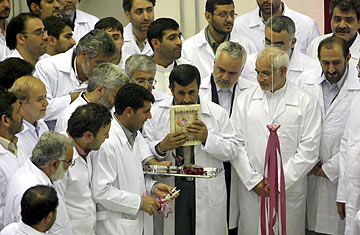
Iranian President Mahmoud Ahmadinejad, center, kisses the Koran during the inauguration of Iran's first nuclear-fuel manufacturing plant, located near Isfahan, on April 9, 2009
President Barack Obama took office promising to pursue a diplomatic solution to the standoff over Iran's nuclear program, but so far, he's gotten little out of Tehran. So little, in fact, that the President has given Iran a Sept. 15 deadline to respond positively to his offer of negotiations, or face a heightening of sanctions. As U.S. officials huddled with their European, Russian and Chinese counterparts in Germany on Sept. 2 to review the issue, Iran signaled that it will indeed respond — by offering its own package of proposals to achieve a diplomatic resolution to the standoff. Western leaders at the meeting in Germany urged Iran to agree to a meeting with Russia, China, the key European nations and the U.S. before Sept. 23. But nobody is expecting Iran's proposals to come close to meeting Western demands, and that could leave Obama facing the unenviable choice of being painted as feckless or having to move down a road of escalation that puts a diplomatic solution further beyond reach.
"We can expect that the new Iranian package, much like the most recent Western proposals presented to Iran, will mostly be a repackaging of old positions," says Trita Parsi, an Iran analyst and president of the National Iranian American Council. Until now, Western governments have demanded that Iran suspend its uranium-enrichment program and negotiate an agreement to relinquish it in exchange for a package of economic incentives. But Iran insists that its much-scrutinized enrichment is for peaceful purposes, which it claims as a right under the Nuclear Non-Proliferation Treaty. Its proposals to resolve the standoff have typically focused on strengthening international safeguards against the weaponization of its enrichment facilities. Parsi expects that, at best, the Iranian package will suggest ways of strengthening the international inspection regime. "That's very valuable in itself," he says, "but it's short of what the U.S. has been demanding so far."
Thus far, the two sides have offered diametrically opposed solutions to the problem that uranium-enrichment capability can be adapted to develop nuclear-weapons materiel. The West has insisted that because Iran's intentions are under a cloud of suspicion, it must forgo enriching uranium and instead agree to import its reactor fuel. The Iranians, when they've been in an engaging mood, have focused on reinforcing international safeguards against weaponization. But Tehran hasn't been in an engaging mood for some time now. It showed little interest in the U.S.-backed European proposal of a "freeze-for-freeze" formula, under which Iran would desist from expanding its enrichment capacity in exchange for Western powers' refraining from adopting new sanctions. Nor has Tehran given more than a desultory response to Obama's offer of talks.
Iran's tumultuous postelection climate has prompted many analysts to question whether Tehran is even capable of engaging in the tricky search for a compromise right now. But the rejection of the proposals that are based on Iran's surrendering the right to enrich uranium is not confined to hard-liners like President Mahmoud Ahmadinejad. Although Iran's contending political factions advocate different approaches to dealing with the West, there is a consensus among them — supported by the electorate — on Iran's right to develop its own reactor fuel.
Some influential voices in the West have questioned the viability of demanding that Tehran give up enrichment altogether. Senate Foreign Relations Committee chairman John Kerry said in June that it was "ridiculous" to make Tehran's surrender of that right a condition for a diplomatic solution. "They have a right to peaceful nuclear power and to enrichment in that purpose," Kerry told the Financial Times. But there has been no change in the official U.S. position. Revulsion over the Iranian regime's handling of its June presidential election has further narrowed Obama's room for diplomatic engagement with Iran. And Obama is under growing pressure from key actors like Israel as well as from Capitol Hill and his Administration to ratchet up the pressure.
The House and Senate are expected to pass legislation in the coming session applying energy sanctions that would target third-country corporations that are supplying Iran with refined gasoline. The efficacy of such measures is questionable, not only because they are more likely to produce belligerence than cooperation from Tehran, but also because Iran is confident in its ability to weather their impact. And Russia and China are likely to oppose such measures, potentially threatening the international consensus the U.S. has worked to cultivate. Some observers believe that a climate of U.S.-led international pressure on Iran will be welcomed by hard-liners as an opportunity to consolidate their grip on power.
Obama has not asked for much by Sept. 15, just a signal from Iran that it's interested in a compromise. Still, by simply setting the deadline, he may have made it harder for himself to fend off demands that he escalate the confrontation.
